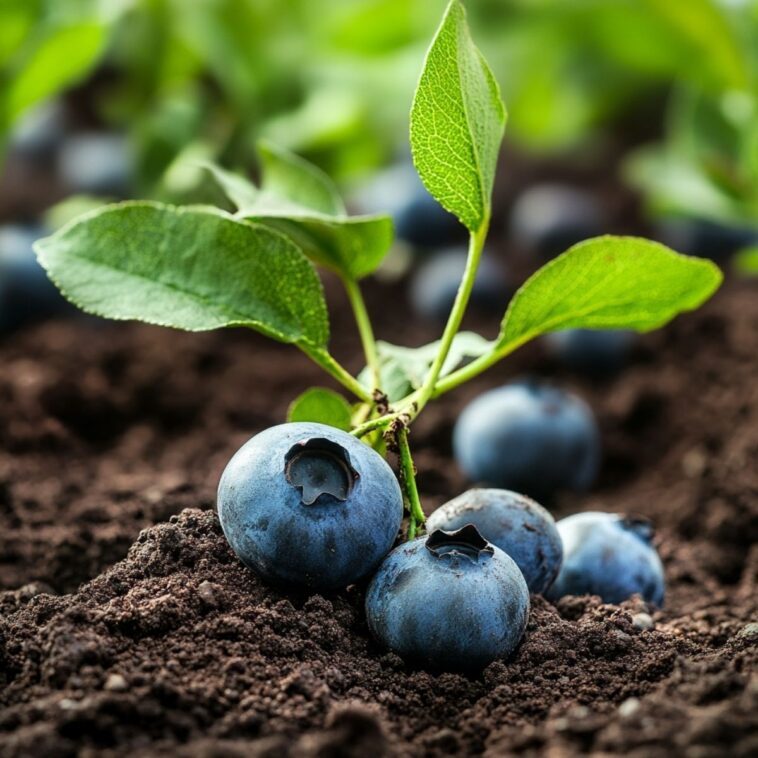Blueberry plants thrive in two key conditions: acidic soil and high nitrogen levels. By using coffee grounds to fertilize your blueberry bushes, you can recycle kitchen waste while creating the perfect environment for your plants to flourish. This simple method helps promote healthy growth and abundant berry production throughout the growing season.
Coffee grounds are an excellent organic option to help maintain the acidity and nutrients blueberries need. With a few easy steps, you can ensure your blueberry bushes receive the right care, all while reducing waste.
The Historical Significance of Blueberries
Blueberry bushes, native to North America, have been a staple for centuries. Indigenous peoples treasured the “star berry,” named for its five-pointed blossom, and used every part of the plant for food, medicine, and preservation during harsh winters. While blueberries are typically planted in early spring, late fall is another suitable time to get them into the ground.
Are Coffee Grounds Beneficial for Blueberries?
Blueberries can be a challenge for home gardeners due to their specific soil preferences. They require highly acidic soil, with a pH level between 4.5 and 5.5, which is too low for many other plants. Using coffee grounds helps maintain the soil’s acidity and provides organic matter that enhances soil health without relying on synthetic chemicals.
Coffee grounds are particularly good for acid-loving plants like blueberry bushes, tomato plants, and rhododendrons. They serve as an excellent DIY fertilizer, helping plants grow strong while repurposing waste that would otherwise end up in landfills.
How to Fertilize Blueberries with Coffee Grounds
Coffee grounds offer a rich source of nutrients, including nitrogen, potassium, and phosphorus, as well as trace minerals like magnesium, calcium, and copper. To maximize the health of your blueberry bushes, apply coffee grounds regularly.
Steps for Using Coffee Grounds on Blueberry Bushes:
- Collect Coffee Grounds: Gather about four or five cups of used coffee grounds. Spread them out in the sun to dry thoroughly.
- Apply to Soil: Rake the coffee grounds into the top two inches of soil around the base of your blueberry bushes, ensuring even distribution without any clumps.
- Reapply as Needed: Depending on the health of your plants, you can repeat this process every two to four weeks. Keep in mind that coffee grounds are best used on mature plants rather than seedlings, which can be sensitive to direct applications.
Coffee Grounds for Potted Blueberries
Different varieties of blueberries, such as Northern Highbush, Southern Highbush, Rabbiteye, and Lowbush, are cultivated worldwide. For those with limited space, container-friendly dwarf varieties are an excellent option.
Applying coffee grounds to potted blueberry bushes is simple. Every two weeks, sprinkle a light layer of dried or fresh coffee grounds around the plant’s base, and then water thoroughly. This method ensures that the plant’s soil stays nutrient-rich and slightly acidic.
Watering Blueberry Bushes with Coffee Water
Blueberry plants are slow-growing and long-living, often taking several seasons before producing fruit. However, they can bear fruit for up to 50 years when properly cared for. Maintaining an appropriate level of acidity and nutrients is essential for their long-term health.
How to Make Coffee Water:
- Mix two cups of dry coffee grounds with a gallon of warm water.
- Use a watering can to pour the mixture around the base of the blueberry bushes, particularly in early spring when they begin to bud.
This method is especially helpful for young plants establishing their root systems.
Adding Coffee Grounds to Compost
You can also incorporate coffee grounds into your compost pile to improve the soil quality for your blueberry bushes. Coffee grounds are considered “green” material due to their nitrogen content, making them an excellent addition to the “brown” materials like dried leaves or straw in a compost heap. Composting coffee grounds helps foster beneficial microorganisms that break down organic matter, boosting the health and structure of the soil.
To avoid any issues with decomposition, add acidic ingredients like coffee grounds in moderation, balancing them with other compostable materials like vegetable scraps and eggshells.
Using Coffee Grounds as Mulch for Blueberry Bushes
Instead of applying a thick layer of coffee grounds directly to the soil, mix a small amount with mulch materials like pine needles or wood chips. Spread this mixture around the base of the plants to help retain moisture and maintain the right soil acidity. Mulch not only aids in moisture retention but also helps suppress weed growth, making it a valuable tool for your garden.
For those with larger areas to cover, many coffee shops, such as Starbucks, offer used coffee grounds for free, which you can use for mulching your garden.
Final Thoughts on Using Coffee Grounds for Blueberries
Blueberries are generally easy to care for, provided they have well-draining, acidic soil and consistent watering. By using coffee grounds as part of your garden care routine, you can create ideal growing conditions for your blueberry bushes while reducing kitchen waste. Combine coffee grounds with mulch, compost, and proper watering practices to support your plants’ health throughout the season.
If you found these tips helpful, share this guide with your fellow gardeners to help them get the best possible harvest from their blueberry bushes. With a little effort, your blueberry plants can reward you with bountiful harvests for many years to come.


